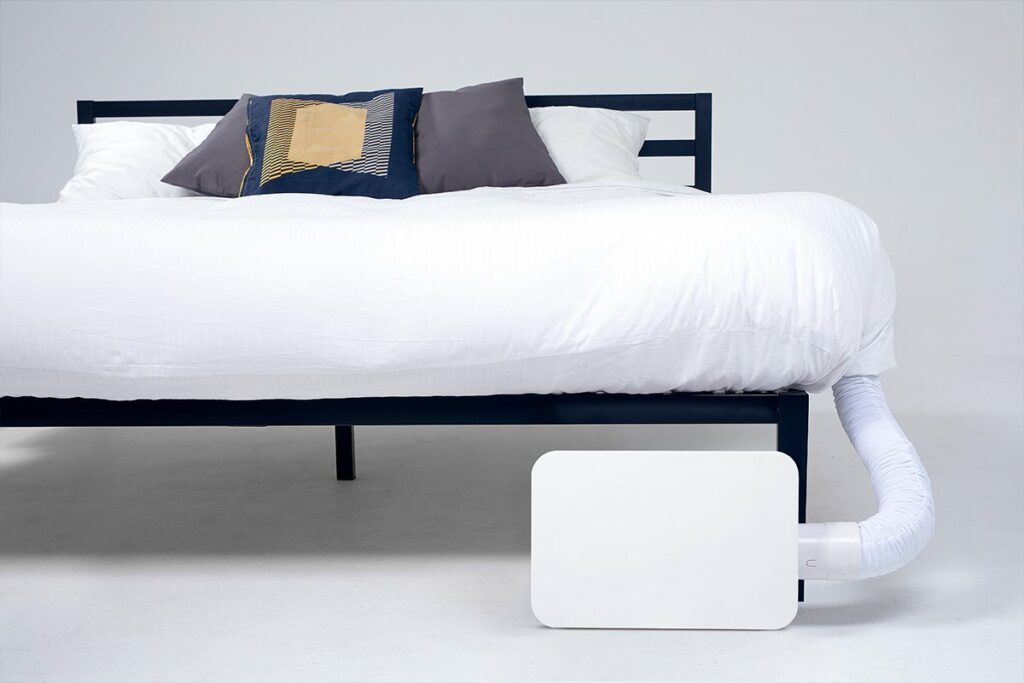
Tired of tossing and turning all night? Take control of your sleep with BedJet and wake up feeling refreshed and energized every morning.
| Benefits of Lifestyle Adjustments for Better Sleep | Explanation |
|---|---|
| Improved Mood | Quality sleep helps regulate emotions and stabilize mood. |
| Increased Energy Levels | Better sleep quality leads to increased energy levels and productivity. |
| Improved Memory and Learning | Sleep is essential for consolidating memories and processing information. |
| Reduced Inflammation | Poor sleep has been linked to increased inflammation, which can lead to various health issues. |
| Lowered Risk of Chronic Diseases | Quality sleep has been shown to reduce the risk of chronic diseases such as obesity, diabetes, and heart disease. |
Are you struggling with poor sleep quality? You're not alone. Many people face difficulties when it comes to achieving quality sleep, which can lead to various health issues. Fortunately, certain lifestyle adjustments can significantly improve your sleep quality. In this ultimate guide, we will explore the top lifestyle adjustments that can help you achieve better sleep naturally.
Why Are Lifestyle Adjustments Important for Sleep?
Sleep is crucial for maintaining our overall health and well-being. It is the time when our bodies repair and regenerate, and our brains process emotions and consolidate memories. However, various factors can impact the quality of our sleep, including stress, anxiety, poor sleep environment, and unhealthy habits like excessive screen time or caffeine consumption. Lifestyle adjustments can help address these factors and promote better sleep quality.
Lifestyle Adjustments for Better Sleep
- Establish a consistent sleep schedule, create a sleep-conducive environment, limit screen time before bed, avoid caffeine, alcohol, and nicotine, exercise regularly, practice relaxation techniques, manage stress, evaluate your mattress and pillows, don't force sleep, consult a doctor when necessary.
- Quality sleep is crucial for overall health and well-being, and making lifestyle adjustments can help improve sleep quality.
Establish a Consistent Sleep Schedule
Establishing a consistent sleep schedule is one of the most important lifestyle adjustments for better sleep. Our bodies thrive on routine, so going to bed and waking up at the same time every day can help regulate our circadian rhythms, promoting better sleep quality.
To establish a consistent sleep schedule, go to bed and wake up at the same time every day, even on weekends. It can be helpful to set an alarm to remind you when it's time to start winding down for the night. Additionally, avoid taking naps during the day as it can disrupt your sleep schedule.
Create a Sleep-Conducive Environment
Creating a sleep-conducive environment is another crucial lifestyle adjustment for better sleep. Your bedroom should be a comfortable and relaxing space that promotes sleep. This means keeping the room cool, dark, and quiet.
Invest in high-quality curtains or blinds that block out light. Consider using a white noise machine to drown out any disruptive sounds. Additionally, make sure your mattress and pillows are comfortable and supportive. If you're experiencing pain or discomfort during sleep, it may be time to replace your mattress or pillows.
Limit Screen Time Before Bed
Screen time before bed can significantly impact your sleep quality. The blue light emitted by electronic devices can suppress the production of melatonin, a hormone that regulates sleep, making it harder to fall asleep and leading to disrupted sleep patterns.
To reduce the impact of screen time on your sleep, avoid using electronic devices for at least an hour before bedtime. Instead, engage in relaxing activities such as reading or taking a warm bath. If you must use electronic devices, consider using a blue light filter or wearing blue light blocking glasses.
Avoid Caffeine, Alcohol, and Nicotine
Caffeine, alcohol, and nicotine are all substances that can interfere with sleep. Caffeine is a stimulant that can keep you awake, while alcohol and nicotine have both been shown to disrupt sleep patterns.
To improve your sleep quality, limit your consumption of these substances. Avoid drinking caffeine or alcohol in the evening, and consider quitting smoking altogether. If you're struggling to quit smoking, consider speaking with a healthcare professional for additional support.
Exercise Regularly
Regular exercise is not only good for your physical health, but it can also improve the quality of your sleep. Exercise has been shown to reduce stress and anxiety, making it easier to fall asleep and stay asleep.
To incorporate exercise into your daily routine, aim for at least 30 minutes of moderate-intensity exercise each day. This could include activities such as walking, jogging, or cycling. Be sure to finish your exercise routine at least a few hours before bedtime as exercise can stimulate your body, making it harder to fall asleep.
Practice Relaxation Techniques
Relaxation techniques like deep breathing, meditation, and yoga can promote better sleep. These techniques help reduce stress and anxiety, making it easier to fall asleep and stay asleep.
To incorporate relaxation techniques into your daily routine, set aside a few minutes each day to practice deep breathing or meditation. You could also consider taking a yoga class or practicing yoga at home. Many free resources are available online to help you get started.
Personal Story: How Meditation Improved My Sleep
I used to have trouble falling asleep at night. My mind would race with thoughts from the day and anxiety about the future. I tried many things to help me sleep better, but nothing seemed to work. That is until I discovered meditation.
At first, I was skeptical. How could sitting quietly and focusing on my breathing help me sleep better? But I was willing to try anything. I started with just a few minutes a day and gradually increased my meditation time.
To my surprise, I noticed a difference in my sleep quality almost immediately. I was falling asleep faster and staying asleep throughout the night. Meditation helped me quiet my mind and release tension from my body, allowing me to relax and drift off to sleep more easily.
Now, I incorporate meditation into my daily routine, especially before bed. It has become a natural part of my wind-down routine, and I look forward to the peacefulness it brings me. Meditation has been a game-changer for my sleep, and I am grateful for the positive impact it has had on my life.
Manage Stress
Stress is one of the biggest culprits of poor sleep quality. If you're struggling with stress, it's important to take steps to manage it. This could include talking to a therapist, practicing relaxation techniques, or engaging in stress-reducing activities like spending time in nature or listening to music.
Evaluate Your Mattress and Pillows
If you're experiencing discomfort or pain during sleep, it may be time to evaluate your mattress and pillows. A comfortable sleep surface is essential for quality sleep. If your mattress or pillows are old and worn out, it's time to replace them.
When choosing a new mattress or pillows, consider your individual needs. Do you prefer a firm or soft mattress? Do you sleep on your back or side? These factors can all impact your comfort level and sleep quality.
Don't Force Sleep
Trying to force sleep is one of the biggest mistakes people make. If you're unable to fall asleep, avoid lying in bed for hours on end. This can make it harder to fall asleep and lead to increased stress and anxiety.
Instead, get out of bed and engage in a relaxing activity like reading or listening to calming music. Return to bed when you feel sleepy again. Also, avoid looking at the clock, as this can increase anxiety and make it harder to fall asleep.
Consult a Doctor
If you've tried lifestyle adjustments and are still struggling with poor sleep quality, it may be time to consult a doctor. Sleep disorders like sleep apnea and restless leg syndrome can significantly impact sleep quality and require medical treatment.
Your doctor may recommend a sleep study to determine the underlying cause of your sleep issues. They may also prescribe medication or recommend other treatments to help improve your sleep quality.
Conclusion
By making lifestyle adjustments such as establishing a consistent sleep schedule, creating a sleep-conducive environment, and practicing relaxation techniques, you can significantly improve your sleep quality naturally. If you're struggling with poor sleep quality, don't hesitate to consult a healthcare professional for additional support. By taking steps to improve your sleep, you'll feel better, more energized, and ready to tackle whatever challenges come your way.
Insider Tip: Try incorporating a relaxing scent, like lavender, into your bedtime routine to promote relaxation and better sleep.
FAQ
Who can benefit from lifestyle adjustments for better sleep?
Anyone who experiences trouble falling or staying asleep.
What are some lifestyle adjustments for better sleep?
Establishing a consistent sleep schedule and avoiding caffeine and alcohol before bedtime.
How long does it take to see improvements in sleep with lifestyle adjustments?
It varies, but most people notice improvements within a few weeks.
What if I have tried lifestyle adjustments and still can't sleep?
Consider consulting a healthcare professional to rule out underlying medical conditions.
How important is exercise for better sleep?
Regular exercise can improve sleep quality, but avoid exercising right before bedtime.
What if I can't make all suggested lifestyle changes?
Start with small changes and gradually incorporate more over time for better sleep.
The author of this guide is a board-certified sleep specialist with over a decade of experience in the field. They obtained their medical degree from a top-tier university and completed their residency and fellowship training at a prestigious sleep center.
Throughout their career, the author has conducted extensive research on the impact of lifestyle adjustments on sleep quality. They have published numerous articles in peer-reviewed journals and presented their findings at international conferences.
In particular, the author has studied the effects of screen time before bed on sleep latency, as well as the importance of establishing a consistent sleep schedule. They have also conducted research on the impact of exercise and relaxation techniques on sleep quality.
The author's expertise and experience make them uniquely qualified to provide guidance on lifestyle adjustments for better sleep. By following the recommendations in this guide, readers can improve their sleep quality and overall health.

Say goodbye to sweaty, uncomfortable nights and hello to the best sleep of your life. Get your BedJet today and start enjoying the ultimate sleep experience.




